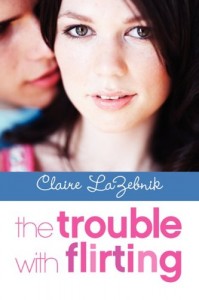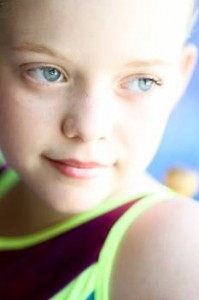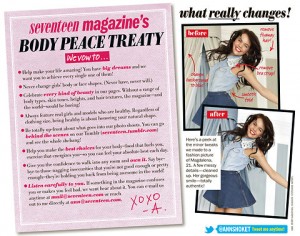Interview: The Trouble With Flirting Author Claire LaZebnik
Posted on February 26, 2013 at 8:00 am
Claire LaZebnik’s latest YA novel, The Trouble with Flirting, published today, is the witty and insightful story of Franny Price, a talented teenager who gets a summer job working with her aunt, the costumer for a high school drama program putting on plays by Shakespeare. I loved it! LaZebnik was nice enough to answer my questions.
Jane Austen’s Mansfield Park inspired some elements of your story, including the name of the main character. Your Franny Price is much more confident and outspoken than Austen’s Fanny Price. What are their most important similarities and differences?
They’re both thoughtful, decent, intelligent young women who occasionally get overlooked because they’re not flashy or gorgeous—they’re the type that grows on you, rather than the type that hits you over the head from the beginning. So that’s how they’re similar.
But, like all of us, they’re products of the age they live in, which ultimately makes them more different than similar. Fanny lives in an era when a woman with no independent means either has to marry well or face a lifetime of poverty: she has no way to pull herself up except through marriage. Alone, she’s impoverished; married, she’s dependent on her husband’s goodwill. Franny, on the other hand, is a modern young woman, who’s dependent on no one but herself for her future success. She may have to work when others get to play, but that’s a cash issue, not a class issue and really just proves how self-sufficient she is. When she falls in love, it’s for fun, not to ensure her future.
One of the most important elements of Austen’s Mansfield Park is a theatrical production that ends very poorly. What do you as an author think that giving the characters a theatrical setting allows you to explore?
Actually, I think the whole idea of any summer program–not just an acting one–is that you get to escape whoever you are at home and play at being whatever you want to be and of course acting does exactly the same thing. And the contrast between getting up on stage and acting–which is fun and glamorous–and sitting backstage sewing costumes–which is the opposite–really added to Franny’s outsider status. But she’s not self-pitying or angry and I think that reflects well on her character, especially since she proves she’s as good an actor as any of them when she’s given the chance.
Your characters are very witty and it was a nice change to read a book about teenagers where the main characters were not too shy or insecure to speak up. What can readers learn from characters who have that kind of confidence and humor?
I think it’s incredibly important for boys and girls (and men and women) to feel comfortable talking to each other. Nothing makes me sadder than hearing people ask for advice on “how to talk to the opposite sex.” Really? Because in my experience, you open up your mouth and the words come out. The strongest relationships I know are the ones based on friendship, and friendship grows when you talk easily, openly, and with a shared sense of humor.
In addition to Mansfield Park, another classic literary work that inspires this book is Twelfth Night, the Shakespeare play that the characters perform. Why did you choose that play and how does it relate to the themes of the book? Is the duality and mirroring of Twelfth Night relevant to your story?
So I’m embarrassed to admit that I chose Twelfth Night largely because I knew the play pretty well and could write about it easily, although you can definitely find a lot of parallels between it and the novel (for one thing, characters have a tendency to fall in love with the wrong people in both). But it’s actually Measure for Measure that I chose more deliberately for them to discuss because there’s so much in that play about how you shouldn’t trust someone just because he appears on the outside to be good. All of that really does tie into The Trouble with Flirting, since Franny makes the mistake of judging people on how they appear and not on what they actually do.
Why is it important that Franny comes from a family with much less money than the kids in the theater program have? How does her unexpected opportunity to appear on stage affect the way the others see her?
In Austen’s Mansfield Park, Fanny can’t shake her outsider status no matter how long she lives with the Bertrams, because she’s dependent on their generosity and her father isn’t a gentleman. I decided that putting Franny to work during the summer when every other high schooler is just having fun would capture that “poor cousin on the outside looking in” feeling.
When she gets to join a cast, she can prove that she’s just as talented as everyone else, that she could have gotten into the program if she’d been able to afford it, and I think that’s important to her self-esteem. She stops being so much of an outsider at that point–but other obstacles crop up for her.
What is the hardest part of writing a book like this? What is the most fun?
Hardest part is this: promoting the book. I’m a homebody. I like to sit in my house and write–it’s trying to get people to hear about my books that I find challenging.
The most fun is that moment before you start writing, when you’re thinking about the story and phrases start popping into your head and you see everything so clearly and it feels like it’s going to all come together perfectly–like you could just sit down and the book would flow from your fingertips in a few short hours. Of course, when you sit down to actually put it on paper, everything gets obscured and confusing again. But that moment is lovely.
What were some of the books you enjoyed most when you were Franny’s age? What do your kids like to read?
YA books basically didn’t exist when I was a kid. There were children’s books and there were books for adults, and pretty early on I took a lot of pride in reading adult books. I wanted to read everything I’d ever heard of, so I read D.H.Lawrence in middle school and Virginia Woolf when I was fourteen. I absolutely loved Colette’s Claudine books, which no one reads anymore, and I reread Austen’s novels every chance I got. I really read anything I could get my hands on. (I wasn’t a very social kid, as you can tell–I was always reading.)
My 15-year-old daughter has no interest in reading adult books; she likes YA books, but nothing too heavy or too supernatural. She likes her novels light and romantic, which might explain why I write that kind of book. Anyway, it’s interesting to me that the “invention” of this whole YA genre may have made teenagers less interested in reading adult books. Which isn’t necessarily a bad thing: a lot of my favorite novels from the last decade have technically been YA novels–I think some of the best writing of our times is being done in that genre.


